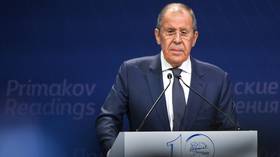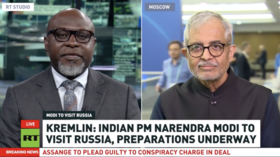West wants to disrupt Russia-India-China engagement – Lavrov

Russia, China, and India would benefit from enhancing trilateral cooperation within the ‘RIC’ format, which emerged before BRICS. However, the West seeks to obstruct this, Russian Foreign Minister Sergey Lavrov has said.
“The desire to maintain trilateral cooperation is evident in both Beijing and New Delhi. I am convinced that we will all benefit if this trio develops common approaches and strives to adopt unified positions on key issues of the Eurasian continent and on the global agenda,” Lavrov stated, speaking at the Primakov Readings International Forum in Moscow.
“Frankly, the West wants the opposite. The West wants this trio never to strengthen its solidarity or present a united front. The West wants to undermine this trio in every possible way,” he added, noting that there are plans to revive the RIC format.
“We still believe that in such tense moments, it is much more useful to talk to each other, and proposed gathering the RIC trio about a year ago, and recently revisited this idea. But for now, our Indian friends think that the situation on the border needs to be fully resolved first. We understand them,” Lavrov said.
The concept of a Russia-India-China ‘strategic triangle’ as an arrangement to add stability and credibility to the post-Cold War system of international relations was brought up by former Russian Prime Minister Evgeny Primakov in December 1998. He suggested that it might constrain the US’ hegemonic behavior and represent a significant step towards multi-polarity in global affairs.
While both New Delhi and Beijing were initially lukewarm to the idea, since 2001, the three countries have been meeting regularly – over 20 times so far – Lavrov noted. The Covid-19 pandemic and the standoff between Indian and Chinese troops along the Himalayan border have stalled engagement within RIC.
Moscow facilitated a high-level meeting between the Indian and Chinese foreign ministers in September 2020 to ease tensions. It took place on the sidelines of the Shanghai Cooperation Organization foreign ministers’ meeting, where both sides agreed to continue dialogue towards de-escalation.
While a certain level of disengagement was achieved through more than 20 rounds of talks, the border dispute between the two neighbors has not been resolved.
Regarding Russia’s economic ties with India and China in the current geopolitical climate, Lavrov said both Asian powerhouses would like to see the global economy stabilized. He noted that both countries, given the size of their economies, are not questioning the “fundamentals and mechanisms of globalization established by the US,” and are not “significantly doubting” the role of the US dollar, “which many still want to rely on.”
Despite this, at the bilateral level, Moscow’s transactions with Beijing – and to a certain extent with New Delhi (around 60%) – are now settled in their national currencies to counter Washington’s ability to target countries with unilateral sanctions.
Where India Meets Russia: Follow and share RT India on X and Instagram













